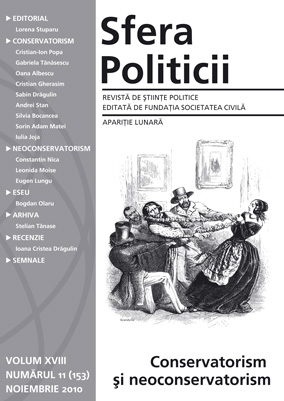Neoconservatorismul american și echilibrele de putere din Orientul Mijlociu în primul deceniu al secolului al XXI-lea
American neoconservatism and the balance of power in the Middle East during the first decade of the 20th century
Author(s): Eugen LunguSubject(s): Politics / Political Sciences
Published by: Fundaţia »Societatea Civilă« (FSC)
Keywords: neoconservatism; the Middle East; power balances; globalsecurity; security strategy; the Bush doctrine; war against terrorism
Summary/Abstract: Neoconservatism had a strong influence on US foreign and security policy during the George W. Bush administration. The American neoconservatives have placed Iraq on the main direction in the war against terrorism, believing that the democratization of the Arab countries will have positive effects on the Middle East region. The Iraq war, which is considered by leading experts in security studies a failure of the American neoconservative policy, has caused the imbalance of power relations which exist in the Middle East region. The future of the Middle East is uncertain due to the complex problems in the region: the conflict between Israel and the Palestinians, opposition of Shiite and Sunni, Kurdish issue, the Lebanese Hezbollah actions, etc. We believe that this situation of insecurity in the region will continue into the coming decades.
Journal: Sfera Politicii
- Issue Year: 2010
- Issue No: 153
- Page Range: 78-83
- Page Count: 6
- Language: Romanian

